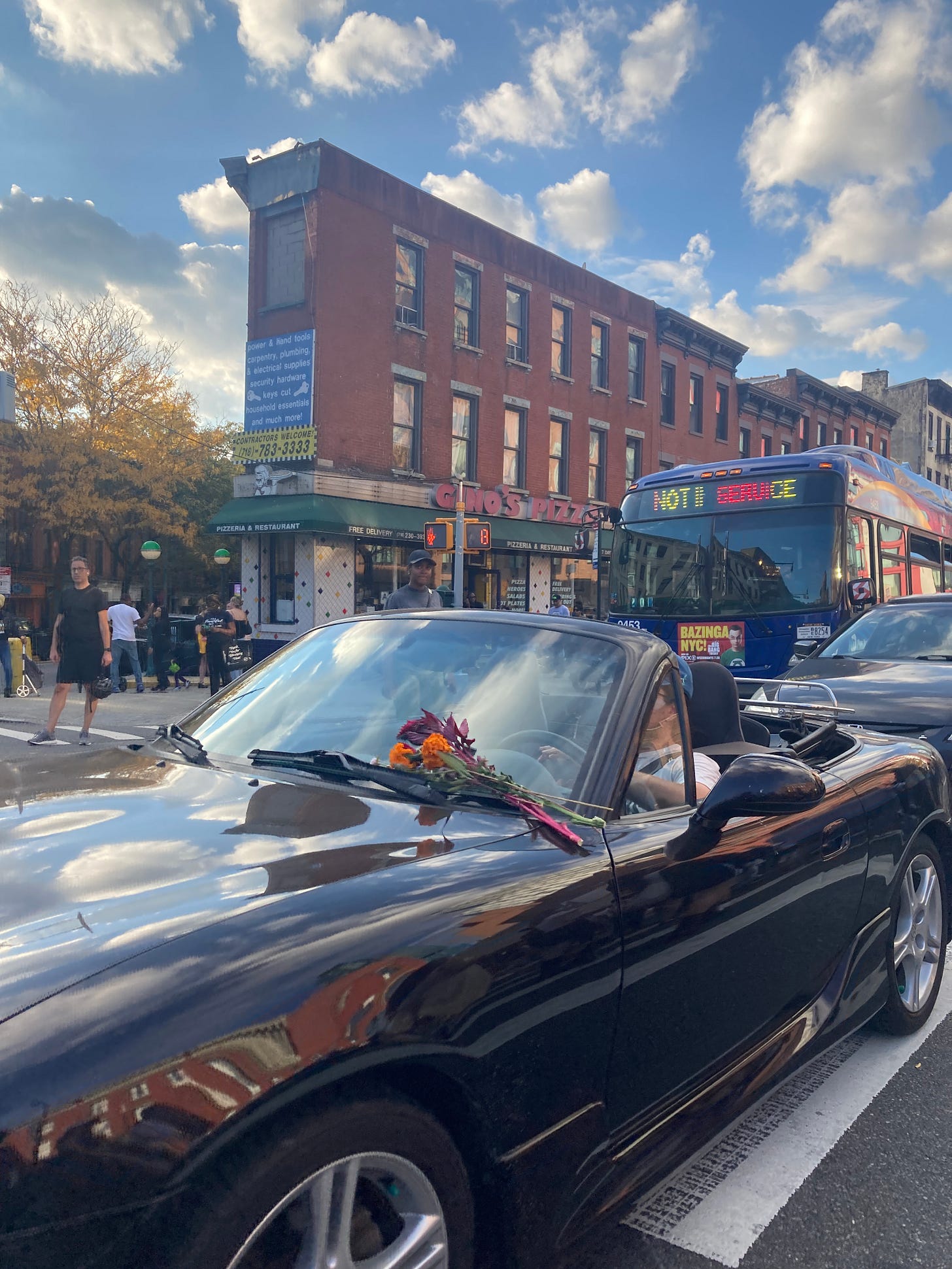If you would like to support this work, in the spirit of generosity, please consider becoming a paid subscriber.
Alexis Pauline Gumbs1 reminds us that Audre Lorde read the news daily and processed her nightmares about the violence against children into poetry and an ethic of honest parenting.
Can I say that my dreamscape is leaning toward nightmare lately? The more Palestinian bodies I see in my Instagram Reels the bloodier my dreams become: hiding from mass shooters and horror movie plots. It feels like the least of consequence that witnessing so much violence can do to one. In the middle of this, I returned to Audre Lorde’s essay The Transformation of Silence into Language and Action* for our Social Change Ecosystem working group. It is a reminder that dreams are poetry, that we can put language to our dreams, and that we no longer self-silence2.
The paper is a transmission of her cancer insights. Lorde tells us of the stark illumination of her cancer diagnosis, the urgency of her mortality, and the futility of fear in the face of all of this. I am struck by the dharma of these words and the way that Lorde cut through the delusion of fear with the ultimate truth of anicca, or impermanence.
In becoming forcibly and essentially aware of my mortality, and of what I wished and wanted for my life, however short it might be, priorities and omissions became strongly etched in a merciless light, and what I most regretted were my silences. Of what had I ever been afraid? To question or to speak as I believed could have meant pain, or death. But we all hurt in so many different ways, all the time, and pain will either change or end . Death, on the other hand, is the final silence. And that might be coming quickly, now, without regard for whether I had ever spoken what needed to be said, or had only betrayed myself into small silences, while I planned someday to speak, or waited for someone else's words.
Audre Lorde, The Transformation of Silence into Language and Action
Real Deal Bodhisattva Words. When faced with the inevitability of her death Lorde resists directing her mind toward doubt. Instead, she turned toward a questioning that allowed for the integration of crisis into her life. In confronting fear and giving voice to her feelings, Lorde creates a permanence for herself, amongst the impermanence. Her questioning here is pointed and deep, creating a lineage of clear seeing, “We can learn to work and speak when we are afraid in the same way we have learned to work and speak when we are tired. For we have been socialized to respect fear more than our own needs for language and definition, and while we wait in silence for that final luxury of fearlessness, the weight of that silence will choke us.” (Lorde)
Our silence will not save us.
Our silence chokes.
We are becoming unblinded from fear.
*
Last week, I watched “Nothing Compares” the documentary about the life, politics and resonance of Sinéad O'Connor. Like many, I had no idea of her strength and integrity - she was saying the truth far before anyone cared to open their eyes - until she died earlier this year.
Sinéad also resisted silence. On the SNL stage, she stares directly into the camera and performs an a cappella version of Bob Marley’s “War” based on the original text of a speech given by Haile Selassie to the UN General Assembly replacing references to the 1963 socio-political of Angola, Mozambique and South Africa with lyrics related to child abuse.3 I implore you to revisit the performance and then directly text me with your commentary.
After the performance in a statement explaining her action, Sinéad explains her history of abuse, placing it not only in the history of her people but in solidarity with globally oppressed peoples (common denominator: the British Empire).
“My name is Sinéad O’Connor. I am an Irish woman. And I am an abused child. The only reason I ever opened my mouth to sing was so that I tell my story and have it heard.
The cause of my abuse is the history of my people, whose identity and culture were taken away from them by the British with full permission from The “Holy” Roman Empire. Which they gave for money and in the name of Jesus Christ…
…The story of my people is the story of the African people, the Jewish people, the Amer-Indian people, the South American people.”
-Sinéad O’Connor4
How many people need to warn us about silence before we take action? Presumably, as progressives, we hold a similar value of morality, a shared view of the humanity of others that would call us to truth-telling in the face of such heightened global despair. Thinking in fractals: are you having honest conversations with your loved ones? Are you looking at the causes and conditions of our / your present moment?
Are you speaking your emotions?
Are you extending your hands outward?
Are you removing the stone from your throat?
*
I am so vaguely rageful. I spent last Saturday morning in the garden ripping at the knotted throats of morning glory and thinking about the conservative media group that drives a virtual billboard around Columbia doxxing students who signed a petition in solidarity with the Palestinian people. Their names and photos in stop-and-start traffic down Amsterdam Avenue.
This time last year I was on retreat chanting the Kuan Yin Dharmas. Kuan Yin, the Boddhisattva of Compassion, hears the cries of the world and responds. She is often depicted in repose with one arm resting on an uplifted knee and the other foot on the floor, ready to manifest wherever people need help. After spending a week invoking the energy, compassion, and vibrational frequency of Kuan Yin, I boarded a flight from SFO to Newark, for what would be a choppy first hour of sojourn. As the plane rocked back and forth, I didn’t feel the familiar bolts of anxiety course through my body. Instead, I distinctly felt held in the protection of the Kuan Yin dharmas.
Now, one year out from that retreat, I find myself at a march somewhere between Grand Army Plaza and Barclay Center, feeling the same resonance. It is felt through the collective utterance of over 100,000 people in recitation of the demand for ceasefire and the liberation of all oppressed peoples. In the way of mantras, Hail Mary-s, calls to prayer, these voices lift together in the incantation of our oneness. We are in devotion, coming together to chant and use our own Boddhisattava nature to invoke protection, healing and blessings for oppressed peoples everywhere.
*
In the tradition of Kuan Yin. In the tradition of Sinéad O’Connor. In the tradition of Audre Lorde and countless Black Feminists.
May we hear the cries of the world and be in compassionate response.
xo Jessica
This graphic from Callings & Roles for Collective Liberation from The Slow Factory is reminiscent of the Social Change Ecosystem Map!
Free PDF of pages from Questions to Ask Before Your Bat Mitzvah, Edited by Morgan Bassichis, Jay Saper, and Rachel Valinsky and published by Wendy’s Subway.
Listen to the Palestine Festival of Literature event held on November 1 featuring Michelle Alexander, Rashid Khalidi, Ta-Nehisi Coates, Natalie Diaz, Noura Erakat and Mohammed El-Kurd speaking out against the Israeli assault on Gaza.
Listen to all of Björk’s studio albums and then listen to her give commentary for each album.
Come visit 462 Halsey Community Farm on December 2 from 12 - 3 pm ET to find your next beloved treasure at our fall Bazaar fundraiser. All proceeds go to the operations of the 462 Halsey Community Farm. 🍁
It is almost the seventh anniversary of the very first Arena Summit! To celebrate and to help Arena fill a significant budget gap in the critical 2024 election year, we’re hosting a reunion party on December 9 in New York City. We would love to see you there. (New friends of Arena are also welcome!)
It is the 30th anniversary of the release of Nirvana’s In Utero. Listen and also text me about this.
Work with me.
You can find me weekly at Heal Haus, five days a week at Arena and often at 462 Halsey Community Farm.
🌞
Dr. Alexis Pauline Gumbs is a writer, poet, activist, and researcher. She was the first scholar to research in the papers of Audre Lorde at Spelman College, June Jordan at Harvard University and Lucille Clifton at Emory University during her research for her PhD in English, African and African American Studies and Women and Gender Studies from Duke University.
See also: Poetry Is Not a Luxury.
Sinead’s Perplexing Protest, Washington Post, 1992.
Sinead’s Defense: She Says She Seeks Truth, Los Angeles Times, 1992.











Thank you for your incisive words, as always. I’m adding the Sinead documentary to my list! Admittedly I know very little about her life
Thank you